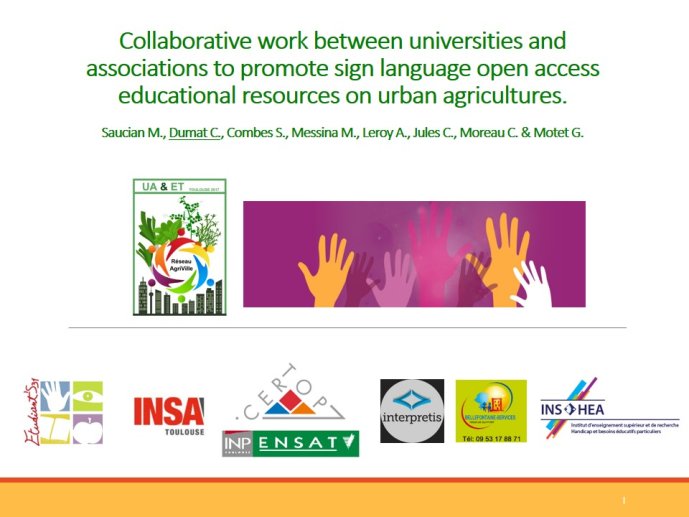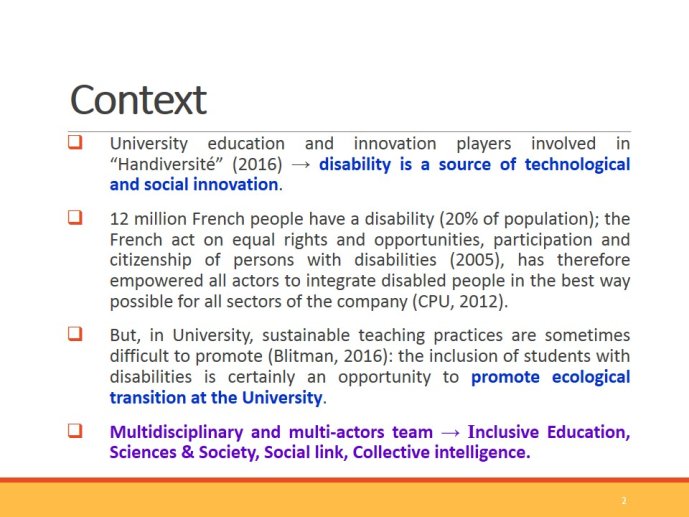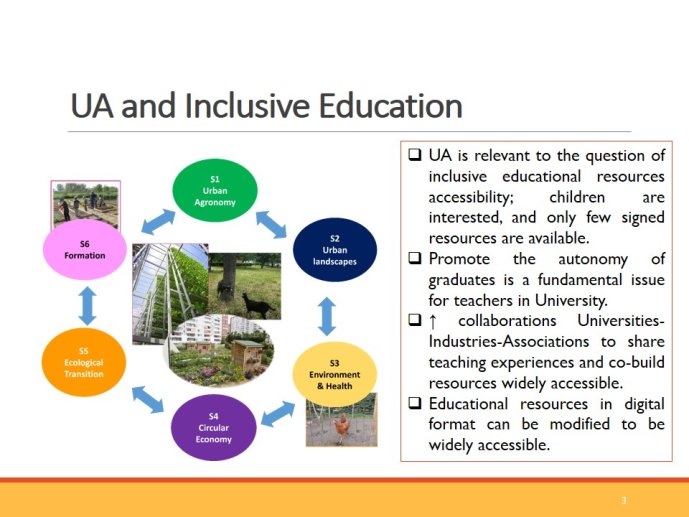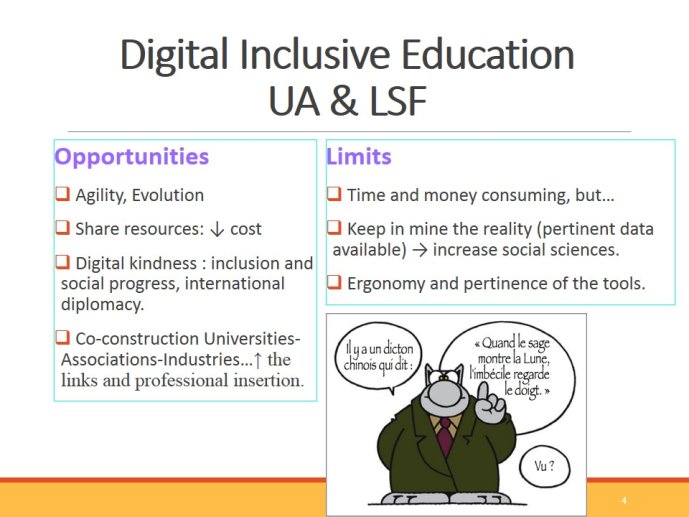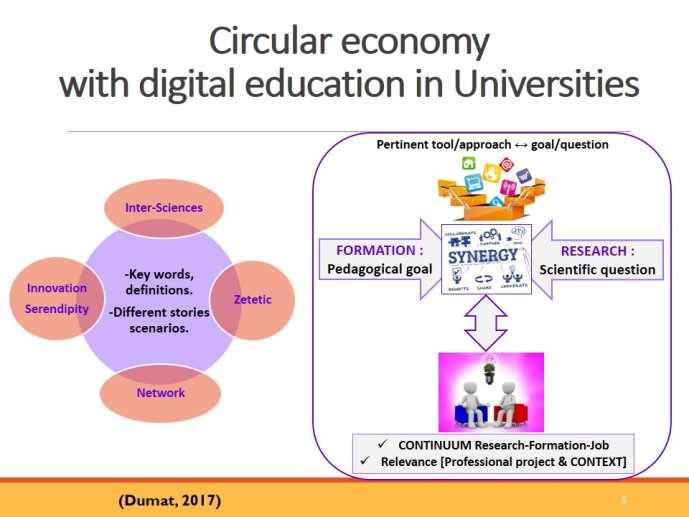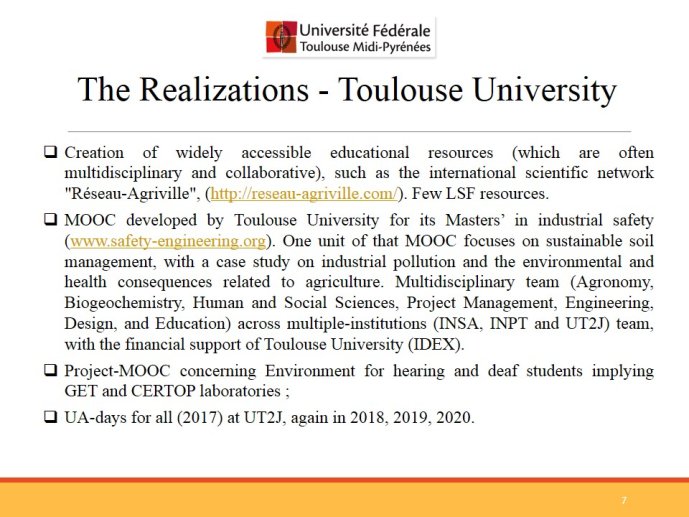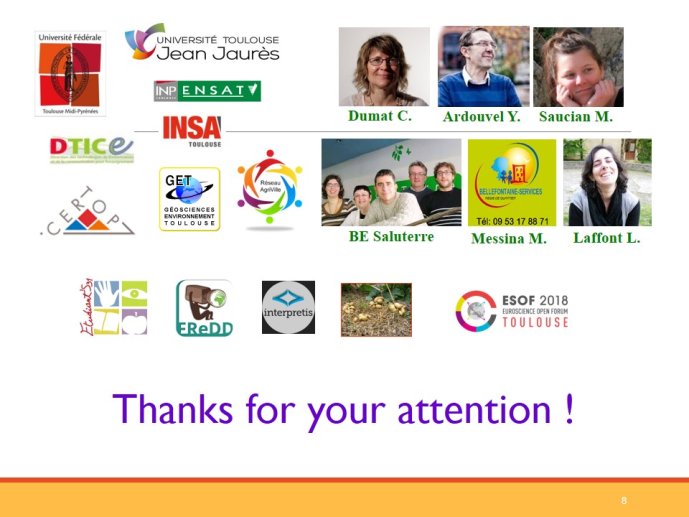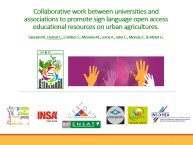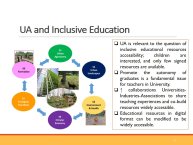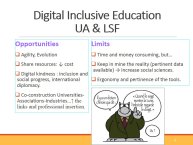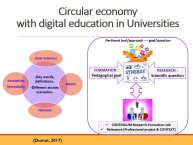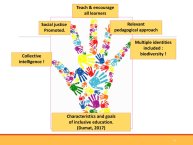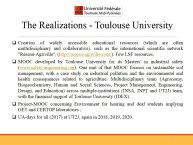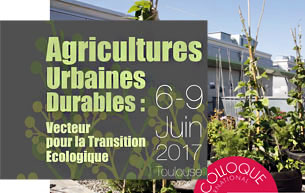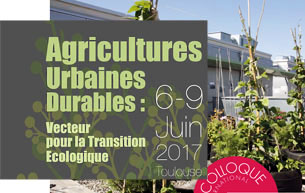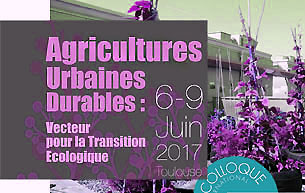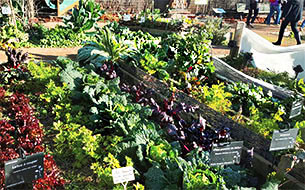Notice
Collaboration entre universités et associations de promotion de langue des signes / Camille Dumat
- document 1 document 2 document 3
- niveau 1 niveau 2 niveau 3
Descriptif
Collaboration entre universités et associations de promotion de langue des signes / Camille Dumat, in "Agricultures urbaines durables : vecteur pour la transition écologique", colloque international organisé par l'École Nationale Supérieure Agronomique de Toulouse (ENSAT), l'équipe Dynamiques rurales du Laboratoire Interdisciplinaire Solidarités, Sociétés, Territoires (LISST) et le Centre d'Étude et de Recherche Travail, Organisation, Pouvoir (CERTOP) de l'Université Toulouse Jean Jaurès-campus Mirail, 6-9 juin 2017.
* Cette communication est traduite en langue des signes française (LSF) par Aurélia Le Roy.
Introduction: According to the research, university education and innovation players involved in the “Handiversité” project (2016), disability is a source of technological and social innovation. Moreover, 12 million French people have a disability (about 20% of the total population); the French act of 11 February 2005 on equal rights and opportunities, participation and citizenship of persons with disabilities, has therefore empowered all actors (both public and private) to integrate disabled people in the best way possible for all sectors of the company (CPU, 2012). But, in the French University, as the “autonomy law” significantly increased professional competitions, the sustainable teaching practices are sometimes difficult to promote (Blitman, 2016; Lemaitre, 2016; Dumat et al., 2015; Wright et al., 2012). In that context, the inclusion of students with disabilities is certainly an opportunity to promote ecological transition at the University.
Material & Methods: This communication concerns the creation of teaching resources in French sign language (FSL) relating to urban agriculture (UA) considered as crucial to promote sustainable towns at the global scale (Dumat et al., 2016). This multidisciplinary subject concerns a wide public (students, citizens, politicians…) of all ages, with especially young children. Our pedagogical project was carried out by a multidisciplinary and multi-actor team: Universities (INPT, INSA and UT2J); Macadam-Gardens (http://macadam-gardens.fr/), an office of study in UA; associations for collective gardens (http://www.toulouse.fr/web/social/centres-sociaux) and UA (http://reseau-agriville.com/).
English pedagogical resources from a MOOC initially created by Toulouse University and dedicated to industrial safety (www.safety-engineering.org; Master's Degree in Safety Engineering and Management in Module 3, Unit1 "Toxic Risks for the Environment") were reviewed and translated into SL. In the field, SL educational films were also produced for different urban agriculture sites in 2017. Moreover, a network of actors concerned by the creation of resources, their use and dissemination, was created and mobilized for this project.
Results & Discussion: Daring to implement transdisciplinarity and innovate to promote sustainable conditions at the global scale is as much the objectives of sustainable UA (social connection, inclusion, reduction of ecological inequalities), as the missions of university teachers. When creating educational resources on UA accessible to people with disabilities, the convergence of sustainable issues promotes synergies between the various actors, both for the creation and use of resources. Several posters, a glossary and films were made in FSL thanks to the work of an agricultural engineer student who mastered the SL in collaboration with a team of University teachers and UA professionals. The pedagogical resources are now in open access on several educational platforms (Agriville Network, Moodle INP-ENSAT and Ocelles-INSHEA) and will be used by different schools.
Conclusions & Perspectives: The subject of UA is particularly relevant to the question of the accessibility of educational resources, since children are very interested in this theme, and for deaf children only few SL resources are available. Developing pedagogical practices that promote the autonomy of graduates is a fundamental issue for teachers in University. This is why it’s important to increase collaborations between university teachers to share teaching experiences and co-build resources widely accessible to all the students. Educational resources in digital format can be modified to be widely accessible (Moreau et al., 2013). Efficiency and pedagogical innovation, are so many challenges for teachers to create synergies and to benefit of the social dynamic induced by the highly motivated students with disabilities. Even if the ability to improvise is essential for trainers to adapt their teaching practices to students (whether disabled or not). Finally, as the SL requires to define precisely, detailed and illustrated by examples the concepts, this could have applications in the development of “big-data” since one of the locks identified is the question of the semen in a context of inter-sciences (ESOFS-2018).
Intervention
Thème
Documentation
Références bibliographiques
Amadieu, Franck, Tricot André. 2015. Les facteurs psychologiques qui ont un effet sur la réussite des étudiants. Recherche et pratiques pédagogiques en langues de spécialité, in "Réussite et échec en langues de spécialité", Cahiers de l'Apliut, 2, vol. XXXIV.
Blitman, Sophie. 2016. Les enseignants-chercheurs sont-ils vraiment des enseignants ?, blog Défis d'amphi / Le Monde, 8 décembre 2016. [En ligne : http://defisdamphi.blog.lemonde.fr/2016/12/08/les-enseignants-chercheurs-sont-ils-vraiment-des-enseignants/].
Broch, Henri. 2008. L'Art du Doute ou Comment s'affranchir du prêt-à-penser. Nice Sophia Antipolis, Éditions Book-e-book, 70 p.
Conférence des présidents d'université (CPU). 2012. Guide de l’accompagnement de l’étudiant handicapé à l’université, 125 p. [En ligne : http://www.cpu.fr/wp-content/uploads/2013/11/Guide-handicap-web2.pdf].
Bastien, Pascal, Campillo, Véronique et al. 2013. L’intelligence collective : livre blanc. Avignon, Éditions Colligence, 40 p. [En ligne : http://www.citedumanagement.com/intelligence-collective-decouvrez-le-livre-blanc/].
Dumat, Camille, Xiong, Tiantian, Shahid, Muhammad. 2016. Agriculture urbaine durable : opportunité pour la transition écologique. Saarbrücken, Presses Universitaires Européennes. [En ligne : http://oatao.univ-toulouse.fr/17424/1/dumat_17424.pdf].
Dumat, Camille. 2015. Comment optimiser durablement l’efficience de l’Université française, Cadre et Dirigeant Magazine, 30 novembre 2015. [En ligne : https://www.cadre-dirigeant-magazine.com/news/comment-optimiser-durablement-lefficience-de-luniversite-francaise/].
Eisenberger Naomie I., Lieberman, Matthew D., Williams, Kipling D. 2003. Does Rejection Hurt?, An fMRI Study of Social Exclusion, 5643, vol. 302, 290-292.
Gori Roland. 2013. La fabrique des imposteurs. Paris, Éditions Les Liens qui libèrent, 320 p.
Chevallier, Sylvain, Husson, Lionel, Maynard, Hélène (2016). Handiversité 2016 : le handicap, un vecteur pour l'innovation. Actes du colloque, 7 juillet 2016, Université Paris-Saclay, 89 p. [En ligne : https://www.universite-paris-saclay.fr/sites/default/files/les_actes_du_colloque_handiversite_2016.pdf].
Kant, Emmanuel. [1784] 2002. Idées d’une histoire universelle au point de vue cosmopolite. Traduction de Philippe Folliot à partir de l'édition des oeuvres complètes de Kant de l'Académie de Berlin (Tome VIII), 18 p. [En ligne : http://classiques.uqac.ca/classiques/kant_emmanuel/idee_histoire_univ/idee_histoire.html].
Phillipson, Amélie. 2017. "Paye ta fac", le blog qui recense le sexisme dans les universités de Toulouse, La Dépêche. 11 janvier 2017 . [En ligne : https://www.ladepeche.fr/article/2017/01/11/2494459-paye-fac-blog-recense-sexisme-universites-toulouse.html].
Lemaitre, Bruno. 2016. An Essay on Science and Narcissism: How do high-ego personalities drive research in life sciences?, Éditions Bruno Lemaître, 269 p.
Moreau, Cédric., Vanbrugghe, Anne, Rincheval, Sandrine, Destrumelle, Anne-Sophie. 2013. Culture(s) et bilinguisme : Ocelles, les enjeux d'une plateforme collaborative en LSF, La Nouvelle revue de l'adaptation et de la scolarisation, 62, 2013/2, 225-235. [En ligne : https://www.cairn.info/revue-la-nouvelle-revue-de-l-adaptation-et-de-la-scolarisation-2013-2-page-225.htm].
Saucian, Maëlis, Dumat, Camille, Combes S., Messina M., Leroy A., Jules C., Moreau C. & Motet G. 2017. Collaborative work between universities and associations to promote sign language open access educational resources on urban agriculture. Communication orale au colloque international de recherche « Urban Agriculture and Ecological Transition », Toulouse. Voir aussi Projet RESPIRATION : Création de ressources pédagogiques numériques accessibles pour une Université inclusive : Collection d’interviews interdisciplinaires signéeset filmées d’experts du colloque international de recherche « Agricultures Urbaines & Transition Ecologique, Toulouse 2017. [En ligne : https://hal.inria.fr/SMS/hal-01616974].
Schuhmacher Mathilde. 2016. De l’Un à l’Autre. Les discours sur l'altérité de Montaigne à Grand Corps Malade. Paris, Éditions Flammarion, coll. Étonnants classiques-Anthologies, 192 p.
Seguin, Eve. 2016. Mobbing, ou l’extermination concertée d’une cible humaine. Découvrir Magazine, La science c'est politique, Association francophone pour le savoir (Acfas), 15 septembre 2016. [En ligne : http://www.acfas.ca/publications/decouvrir/2016/09/mobbing-extermination-concertee-cible-humaine]. [Voir aussi : https://www.youtube.com/watch?v=-RTZXZq-yh0].
Villiot-Leclercq, Emmanuelle., Douady Julien, Pigeonnat Yvan. 2017. L’altérité : un enjeu majeur pour les établissements d’enseignement supérieur, The Conversation, 7 juin 2017. [En ligne : https://theconversation.com/lalterite-un-enjeu-majeur-pour-les-etablissements-denseignement-superieur-78632].
> Voir aussi la bibliographie générale du colloque à télécharger dans l'onglet "Documents" de la vidéo d'introduction au colloque.
Dans la même collection
-
Les jardins partagés à Toulouse / Béatrice Cosme
CosmeBéatriceLe RoyAuréliaLes jardins partagés à Toulouse / Béatrice Cosme, in "Agricultures urbaines durables : vecteur pour la transition écologique", colloque international organisé par l'École Nationale Supérieure
-
Agriculture urbaine durable et éducation inclusive : approche pédagogique par compétence. Introduct…
DumatCamilleLaffontLaureSaucianMaëlysLe RoyAuréliaPlessis-FraissardNoémieAgriculture urbaine durable et éducation inclusive : approche pédagogique par compétence. Introduction au colloque / Camille Dumat, Maëlis Saucian, in "Agricultures urbaines durables : vecteur pour la
-
Nouveaux designs alimentaires, nouveaux modèles économiques / Franck David
DavidFranckLe RoyAuréliaNouveaux designs alimentaires, nouveaux modèles économiques / Franck David, in "Agricultures urbaines durables : vecteur pour la transition écologique", colloque international organisé par l'École
-
Développement de ressources et de modules de formation à distance sur l'entrepreneuriat en agricult…
GeoffriauEmmanuelLe RoyAuréliaDéveloppement de ressources et de modules de formation à distance sur l'entrepreneuriat en agriculture urbaine / Emmanuel Geoffriau, in "Agricultures urbaines durables : vecteur pour la transition
-
Gestion durable des pollutions des sols urbains / Camille Dumat
DumatCamillePlessis-FraissardNoémieGestion durable des pollutions des sols urbains / Camille Dumat, in "Agricultures urbaines durables : vecteur pour la transition écologique", colloque international organisé par l'École Nationale
-
Quand l'agriculture urbaine entre en formation : l'écopâturage enseigné en Licence pro Gestion et a…
EychenneCorinneBoriesOlivierLe RoyAuréliaQuand l'agriculture urbaine entre en formation : l'écopâturage enseigné en Licence pro Gestion et animation des espaces montagnards et pastoraux / Olivier Bories, Corinne Eychenne
-
L’Institut des Transitions Écologique, Économique et Énergétique (IT3E) : former à l’agroécologie p…
GallaiNicolaPlessis-FraissardNoémiepar Nicola Gallai
-
Les agricultures urbaines des toits parisiens aux jardins de Madagascar / Christine Aubry
DumatCamilleAubryChristineLe RoyAuréliaPlessis-FraissardNoémieLes agricultures urbaines des toits parisiens aux jardins de Madagascar / Christine Aubry, entretien dirigé par Camille Dumat et réalisé dans le cadre du colloque "Agricultures urbaines durables :
-
Paysages comestibles : mangez-les ! / Florian Champoux
LaffontLaureLe RoyAuréliaChampouxFlorianPlessis-FraissardNoémiePaysages comestibles : mangez-les ! / Florian Champoux, entretien dirigé par Laure Laffont et réalisé dans le cadre du colloque "Agricultures urbaines durables : vecteur pour la transition écologique"
-
Politiques publiques et agricultures urbaines : synergies à renforcer et verrous à lever / Jean-Noë…
ArdourelYvesConsalèsJean NoëlLe RoyAuréliaPlessis-FraissardNoémiePolitiques publiques et agricultures urbaines : synergies à renforcer et verrous à lever / Jean-Noël Consales, entretien dirigé par Yves Ardourel et réalisé dans le cadre du colloque "Agricultures
-
TOP-Recherche : les agricultures urbaines pour des projets scientifiques pluridisciplinaires enthou…
DumatCamilleLaffontLaureLe RoyAuréliaPlessis-FraissardNoémieTOP-Recherche : les agricultures urbaines pour des projets scientifiques pluridisciplinaires enthousiasmants / Camille Dumat, entretien dirigé par Laure Laffond et réalisé dans le cadre du colloque
-
L'association des Jardiniers de Tournefeuille : des actions "jardins" avant tout en faveur du déve…
ArdourelYvesDupouyDominiqueSaucianMaëlysLe RoyAuréliaPlessis-FraissardNoémieL'association des Jardiniers de Tournefeuille : des actions "jardins" avant tout en faveur du développement durable / Dominique Dupouy, entretien dirigé par Yves Ardourel et Maëlis Saucian et réalisé
Avec les mêmes intervenants et intervenantes
-
La dynamique multiacteur des projets d'agriculture urbaine et d'alimentation durable en région : To…
DumatCamilleLa dynamique multiacteur des projets d'agriculture urbaine et d'alimentation durable en région : Toulouse-Occitanie / Camille Dumat, in "Transitions agro-écologiques et agriculture urbaine en
-
Les jardins partagés à Toulouse / Béatrice Cosme
CosmeBéatriceLe RoyAuréliaLes jardins partagés à Toulouse / Béatrice Cosme, in "Agricultures urbaines durables : vecteur pour la transition écologique", colloque international organisé par l'École Nationale Supérieure
-
Agriculture urbaine durable et éducation inclusive : approche pédagogique par compétence. Introduct…
DumatCamilleLaffontLaureSaucianMaëlysLe RoyAuréliaPlessis-FraissardNoémieAgriculture urbaine durable et éducation inclusive : approche pédagogique par compétence. Introduction au colloque / Camille Dumat, Maëlis Saucian, in "Agricultures urbaines durables : vecteur pour la
-
Nouveaux designs alimentaires, nouveaux modèles économiques / Franck David
DavidFranckLe RoyAuréliaNouveaux designs alimentaires, nouveaux modèles économiques / Franck David, in "Agricultures urbaines durables : vecteur pour la transition écologique", colloque international organisé par l'École
-
Développement de ressources et de modules de formation à distance sur l'entrepreneuriat en agricult…
GeoffriauEmmanuelLe RoyAuréliaDéveloppement de ressources et de modules de formation à distance sur l'entrepreneuriat en agriculture urbaine / Emmanuel Geoffriau, in "Agricultures urbaines durables : vecteur pour la transition
-
Gestion durable des pollutions des sols urbains / Camille Dumat
DumatCamillePlessis-FraissardNoémieGestion durable des pollutions des sols urbains / Camille Dumat, in "Agricultures urbaines durables : vecteur pour la transition écologique", colloque international organisé par l'École Nationale
-
Quand l'agriculture urbaine entre en formation : l'écopâturage enseigné en Licence pro Gestion et a…
EychenneCorinneBoriesOlivierLe RoyAuréliaQuand l'agriculture urbaine entre en formation : l'écopâturage enseigné en Licence pro Gestion et animation des espaces montagnards et pastoraux / Olivier Bories, Corinne Eychenne
-
Les agricultures urbaines des toits parisiens aux jardins de Madagascar / Christine Aubry
DumatCamilleAubryChristineLe RoyAuréliaPlessis-FraissardNoémieLes agricultures urbaines des toits parisiens aux jardins de Madagascar / Christine Aubry, entretien dirigé par Camille Dumat et réalisé dans le cadre du colloque "Agricultures urbaines durables :
-
Paysages comestibles : mangez-les ! / Florian Champoux
LaffontLaureLe RoyAuréliaChampouxFlorianPlessis-FraissardNoémiePaysages comestibles : mangez-les ! / Florian Champoux, entretien dirigé par Laure Laffont et réalisé dans le cadre du colloque "Agricultures urbaines durables : vecteur pour la transition écologique"
-
Politiques publiques et agricultures urbaines : synergies à renforcer et verrous à lever / Jean-Noë…
ArdourelYvesConsalèsJean NoëlLe RoyAuréliaPlessis-FraissardNoémiePolitiques publiques et agricultures urbaines : synergies à renforcer et verrous à lever / Jean-Noël Consales, entretien dirigé par Yves Ardourel et réalisé dans le cadre du colloque "Agricultures
-
TOP-Recherche : les agricultures urbaines pour des projets scientifiques pluridisciplinaires enthou…
DumatCamilleLaffontLaureLe RoyAuréliaPlessis-FraissardNoémieTOP-Recherche : les agricultures urbaines pour des projets scientifiques pluridisciplinaires enthousiasmants / Camille Dumat, entretien dirigé par Laure Laffond et réalisé dans le cadre du colloque
-
L'association des Jardiniers de Tournefeuille : des actions "jardins" avant tout en faveur du déve…
ArdourelYvesDupouyDominiqueSaucianMaëlysLe RoyAuréliaPlessis-FraissardNoémieL'association des Jardiniers de Tournefeuille : des actions "jardins" avant tout en faveur du développement durable / Dominique Dupouy, entretien dirigé par Yves Ardourel et Maëlis Saucian et réalisé

